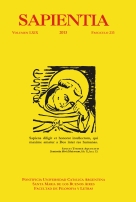Please use this identifier to cite or link to this item:
https://repositorio.uca.edu.ar/handle/123456789/4800| Título: | Tendencia natural y libre en el pensamiento de Santo Tomás de Aquino | Autor: | Ocampo Ponce, Manuel | Palabras clave: | BIEN; NATURALEZA; FIN; LIBERTAD; FILOSOFIA MORAL; TEOLOGIA MORAL; Tomás de Aquino, Santo, 1225?-1274 | Fecha de publicación: | 2013 | Editorial: | Pontificia Universidad Católica Argentina. Facultad de Filosofía y Letras | Cita: | Ocampo Ponce, M. Tendencia natural y libre en el pensamiento de Santo Tomás de Aquino [en línea]. Sapientia. 2013, 69 (233). Disponible en: https://repositorio.uca.edu.ar/handle/123456789/4800 | Resumen: | Resumen: En el pensamiento de Santo Tomás de Aquino, la Filosofía Moral y la Teología Moral tienen al bien como concepto central, es decir, el ser en cuanto apetecible y en cuanto fin de la tendencia o apetito. Lo anterior es debido a que lo bueno expresa el ser en cuanto se relaciona con el apetito y de este modo señala la capacidad del ser para mover la voluntad o una tendencia cualquiera hacia su fin. Es por esto que Santo Tomás sostiene con Aristóteles que el bien coincide con la noción de fin. Y es por la importancia de estos principios y por su repercusión en la moral y sobretodo en la explicación de la libertad moral, que este breve trabajo consiste en una profundización en las relaciones entre el bien, el fin y la naturaleza y algunas de sus aplicaciones a lo que se conoce como tendencia natural o apetito natural y la tendencia libre que se refiere a la voluntad sobre todo a la voluntad de la persona humana. No se trata de un intento por presentar todas las conclusiones que de estos principios se siguen, lo cual correspondería a la Filosofía o a la Teología Moral, sino más bien de una profundización en los principios metafísicos, para asentar los cimientos del orden moral. Abstract: In the thought of St. Thomas Aquinas, both ethics and moral theology have as their central concept the concept of «the good», that is, of being insofar as it is desirable and insofar as it is the end of appetitive tendencies. This is due to the fact that the good expresses being insofar as it relates to the appetite, and thus it expresses the capacity of being to move the will, or of any tendency towards its end. For this reason St. Thomas holds with Aristotle that the good is convertible with the notion of end. And it is due to the importance of these principles and their consequences for morality and moral freedom that in this brief work I attempt to delve into the relationships between the good, the end, and nature, and some of its applications to what is known as natural tendency or natural appetite as well as to the free tendency which is called «the will», especially the will of the human person. It is not an attempt to present all the conclusions that follow from these principles—a task that would correspond to ethics or to moral theology—but an attempt to delve into the metaphysical principles that ground the moral order. |
URI: | https://repositorio.uca.edu.ar/handle/123456789/4800 | ISSN: | 0036-4703 | Disciplina: | FILOSOFIA | Derechos: | Acceso Abierto | Fuente: | Sapientia. 2013, 69 (233) |
| Appears in Collections: | SAP - 2013 Vol LXIX nro. 233 |
Files in This Item:
| File | Description | Size | Format | |
|---|---|---|---|---|
| tendencia-natural-libre-pensamiento.pdf | 250,59 kB | Adobe PDF |  View/Open |
Page view(s)
1,390
checked on Apr 30, 2024
Download(s)
467
checked on Apr 30, 2024
Google ScholarTM
Check
This item is licensed under a Creative Commons License

